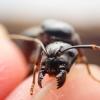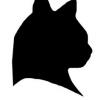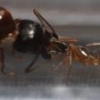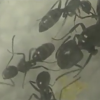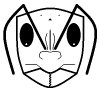- Formiculture.com
- Forums
- Gallery
- Members
- Member Map
- Chat
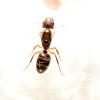
The Prenolepis imparis Thread
Started By
Bracchymyrmex
, Feb 23 2017 10:40 AM
240 replies to this topic
#201
 Offline
-
Posted August 15 2018 - 10:46 AM
Offline
-
Posted August 15 2018 - 10:46 AM
I think they’ve started foraging now anyways.
Website: https://sites.google...home?authuser=0
Instagram: https://www.instagra.../bay.area.ants/
Youtube Channel: https://www.youtube....5Mh2eBAviuO2uw?
#202
 Offline
-
Posted August 15 2018 - 10:49 AM
Offline
-
Posted August 15 2018 - 10:49 AM
I found one of these in April. Didn't have a container though. And my friend smushed it......
#203
 Offline
-
Posted September 11 2018 - 1:55 PM
Offline
-
Posted September 11 2018 - 1:55 PM
So, I've heard for hibernation for these guys I should just do 1 month? That's what Reevak told me, he's the most successful Prenolepis Imparis keeper I know. The colony he is selling me has started getting alates too.
#204
 Offline
-
Posted September 11 2018 - 2:13 PM
Offline
-
Posted September 11 2018 - 2:13 PM
So, I've heard for hibernation for these guys I should just do 1 month? That's what Reevak told me, he's the most successful Prenolepis Imparis keeper I know. The colony he is selling me has started getting alates too.
I followed Reevak's advice and hibernated at 45F for Dec and Jan. They did *nothing* for a long time, and he suggested feeding protein (even though no brood.) I did this early June, queen fattened up substantially, as well as the workers. They started estivation not longer after in June, and she started laying her 2nd season eggs over a couple times. The workers and brood fed entirely on the repletes with no foraging. The new workers eclosed end of August and they stopped estivation. Their reserves were getting pretty low, and a few days later filled up a bunch of repletes, and are about as active as P. imparis usually get at this point. I've kept them at 80F for most of the summer.
Edited by noebl1, September 11 2018 - 2:15 PM.
- Major likes this
#205
 Offline
-
Posted February 4 2019 - 2:32 PM
Offline
-
Posted February 4 2019 - 2:32 PM
I have heard that despite Prenolepis Imparis not hibernating during the winter, they can hibernate. Is this true? If so how is it done? When I put my Prenolepis Imparis in the basement with my other ants as winter began last year, they didn't hibernate. Anyone know?
#206
 Offline
-
Posted February 4 2019 - 3:29 PM
Offline
-
Posted February 4 2019 - 3:29 PM
I took my P. imparis out of a short diapause from mid-December to the end of January. I basically made sure they were all loaded up for sugars and proteins, and they went dormant/stopped foraging, that's when I put them into the basement at 45-50F. After a few weeks I took them out, they immediately gorged themselves on lots of protein, and have been pretty active. I found if P. imaparis in the winter are still active, they are looking for something; sugars, proteins, etc. If they are idle, they have what they need ![]() 90% of the time they sit there and don't do anything.
90% of the time they sit there and don't do anything.
- CamponotusLover likes this
#207
 Offline
-
Posted February 4 2019 - 5:48 PM
Offline
-
Posted February 4 2019 - 5:48 PM
P. imparis usually start rearing brood when it's cold. It's not that they're necessarily inactive, but they don't do much when they're not hungry, and this species keeps a lot of repletes. That's why it's still helpful to give them a "hibernation" period which they don't actually hibernate in, but start laying eggs again.
- CamponotusLover likes this
Website: https://sites.google...home?authuser=0
Instagram: https://www.instagra.../bay.area.ants/
Youtube Channel: https://www.youtube....5Mh2eBAviuO2uw?
#208
 Offline
-
Posted February 5 2019 - 11:29 AM
Offline
-
Posted February 5 2019 - 11:29 AM
I took my P. imparis out of a short diapause from mid-December to the end of January. I basically made sure they were all loaded up for sugars and proteins, and they went dormant/stopped foraging, that's when I put them into the basement at 45-50F. After a few weeks I took them out, they immediately gorged themselves on lots of protein, and have been pretty active. I found if P. imaparis in the winter are still active, they are looking for something; sugars, proteins, etc. If they are idle, they have what they need
90% of the time they sit there and don't do anything.
P. imparis usually start rearing brood when it's cold. It's not that they're necessarily inactive, but they don't do much when they're not hungry, and this species keeps a lot of repletes. That's why it's still helpful to give them a "hibernation" period which they don't actually hibernate in, but start laying eggs again.
Thank you both, I appreciate the info.
#209
 Offline
-
Posted February 5 2019 - 4:45 PM
Offline
-
Posted February 5 2019 - 4:45 PM
Flights in Tennessee today. What temp should I keep them at?
My Main Journal | My Neivamyrmex Journal | My Ant Adoption | My YouTube
Join the TennesseeAnts Discord Server! https://discord.gg/JbKwPgs
#210
 Offline
-
Posted February 5 2019 - 6:22 PM
Offline
-
Posted February 5 2019 - 6:22 PM
I keep my P. imparis at normal room temperatures, I don't treat them special at all. In the summer they are fine 75-80F in the room. The first season I accidentally stunted their growth due to an ac vent blowing on them. Depending on where you live, make sure to watch them, as they will protein load often before summer diapause, especially season 2.
#211
 Offline
-
Posted February 6 2019 - 6:47 AM
Offline
-
Posted February 6 2019 - 6:47 AM
Mine is at room temperature. So hibernate them in summer? Also, they will be flying again today, so if I boosted mine with wild workers, will I be able to put the new queen in the the still?
My Main Journal | My Neivamyrmex Journal | My Ant Adoption | My YouTube
Join the TennesseeAnts Discord Server! https://discord.gg/JbKwPgs
#212
 Offline
-
Posted February 6 2019 - 7:17 AM
Offline
-
Posted February 6 2019 - 7:17 AM
Mine is at room temperature. So hibernate them in summer? Also, they will be flying again today, so if I boosted mine with wild workers, will I be able to put the new queen in the the still?
I wouldn't add wild workers to a new queen, but brood is probably fine (I have done this). I've tried mixing queens with existing colonies, it can be done based on videos I have seen, however I did not have success. The workers initially accepted the new queen, then killed her after a month.
In the summer I just left them alone at room temperature, they won't do anything for awhile. Northern and Southern P. imparis seem to act a little differently. In Florida, S. California, etc and other warm areas P. imparis , usually are in diapause most of the year, and only really active in the winter where it's too cool for other ants, so they have little competition. The study that's posted here somewhere has a study down in N. Florida showed they basically are in diapause all Spring and Summer, and basically only active in later Fall thru very early Spring or late Winter. In the north, the weather here is cooler (and we have obviously harsher winters), so last year I observed a diapause from June thru August, which is similiar to what wild colonies were observed. In the coldest parts of winter here, (Dec/Jan), they are rarely observed. I suspect being in TN, you are likely somewhere in the middle of those observations.
Take this FWIW... I've been following what others in colder areas do that have had success with P. imparis as that's where I am. They are a pretty boring species, as they are fairly idle almost all the time except with repletes get low on resources. Here's what I observed on my colony going into it's 3rd year, and how I handled them:
- From now thru about June, they alternate between active and idle depending when repletes are empty/full. I keep them at normal room temperatures during this time (60-80F).
- The Florida study shows they typically lay only once a season as they enter diapause
- For me in early June, even with no brood, they took in a *lot* of proteins for their repletes (in addition to sugars obviously), but obviously a disproportional amount of protein considering no brood yet
- Mid to late June they stopped foraging, and closed up their nest entrance and entered diapause. They were kept at normal room temperatures (so 70-80F)
- Late June she laid her 2nd season brood of eggs in a couple small batches
- During diapause, the brood was reared entirely off the reserves of the repletes, they did not leave the nest. This explains likely why they load their repletes with protein before hand. The Florida study observed the same behavior. This likely is one cause of failures in newly acquired queens in year 2, as most species don't take much protein unless they have brood. However P. imparis may not forage when they first get their brood, so need all proteins up front before they lay during diapause.
- As the workers were eclosing, and replete resources were getting low, the colony exited diapause in August
- Colony immediately started taking lots of sugars and some proteins
- Once colony was again restocked (repletes were full), colony was fairly idle again from Aug - Dec, though would alternate between active and idle depending on reserves
- By middle of Dec, colony again had filled up the repletes, *and* closed off the nest entrance. I then put them in a short hibernation at 45-50F in the basement.
- End of Jan I removed them from the basement, and warmed them up slowly
- After about 24hours at room temperatures (60-70F), the nest entrance was reopened, and they proceeded to gorge on both protein and sugars
- Currently colony is mildly active (grooming, foraging, etc), and back to the idle/foraging cycle for the last week, nest entrance still open
I'll log continued success or failure as I am in season 3.
This species thrives on neglect as long as they have sources for protein and sugars.
EDIT: Florida study that's a good read: https://www.bio.fsu....ions/1987-3.pdf
Edited by noebl1, February 6 2019 - 7:20 AM.
- rbarreto likes this
#213
 Offline
-
Posted February 6 2019 - 9:25 AM
Offline
-
Posted February 6 2019 - 9:25 AM
So, I should feed them in the spring/ winter, and they will gorge, fill their repletes, and lay eggs in summer diapause?
My Main Journal | My Neivamyrmex Journal | My Ant Adoption | My YouTube
Join the TennesseeAnts Discord Server! https://discord.gg/JbKwPgs
#214
 Offline
-
Posted February 6 2019 - 9:34 AM
Offline
-
Posted February 6 2019 - 9:34 AM
So, I should feed them in the spring/ winter, and they will gorge, fill their repletes, and lay eggs in summer diapause?
If you see any foraging, they are looking for something (sugars, proteins), etc so make sure they have food. I found they take pretty much any sugars. Also for proteins they are pretty flexible, they will readily take fruit flies for sure, but I've also given then pieces of mealworms, frozen live mosquitoes, cricket pieces, freeze dried blood worms, etc. In the wild they are known to take dried earthworms too, but I have not tried this (but likely why they took the freeze dried blood worms).
Since you just caught the queens, likely don't have to worry much for a few months until you see the first workers.
Edited by noebl1, February 6 2019 - 9:36 AM.
- TennesseeAnts likes this
#215
 Offline
-
Posted March 28 2019 - 4:33 PM
Offline
-
Posted March 28 2019 - 4:33 PM
So winter ants were flying here today. Unfortunately, I didn't notice until the flights were wrapping up, so I only got three queens. I want to boost my current colony, but I'm not sure how/when to do that. Should I introduce the new queens now? After they get workers (I've seen people combine colonies before)? I've tried adding a wild worker to their setup before to see how they'd react, and they killed it. Will they accept the new queens?
Edited by Mettcollsuss, March 28 2019 - 5:01 PM.
#216
 Offline
-
Posted March 28 2019 - 4:43 PM
Offline
-
Posted March 28 2019 - 4:43 PM
Where'd you see the flight?
Founding:
1 P. Imparis queen caught 4/26/18
2 L. Umbratus caught 5/8/18
1 C. Pennsylvanicus queen caught 5/7/18 1st Eggs 5/17/18
1 C. Pennsylvanicus queen caught 5/17/18 1st Eggs 5/22/18
1 C. Pennsylvanicus queen caught 5/31/18
1 T. Caespitum(?) queen caught 6/1/18
#217
 Offline
-
Posted March 28 2019 - 5:01 PM
Offline
-
Posted March 28 2019 - 5:01 PM
#218
 Offline
-
Posted March 28 2019 - 6:44 PM
Offline
-
Posted March 28 2019 - 6:44 PM
Do they fly in the morning, or the evening?
#219
 Offline
-
Posted March 28 2019 - 8:20 PM
Offline
-
Posted March 28 2019 - 8:20 PM
#220
 Offline
-
Posted May 8 2019 - 2:15 PM
Offline
-
Posted May 8 2019 - 2:15 PM
I caught one in April. She laid a cluster of eggs last week. I have a journal. (Prenolepis imparis - Michigan)
0 user(s) are reading this topic
0 members, 0 guests, 0 anonymous users

